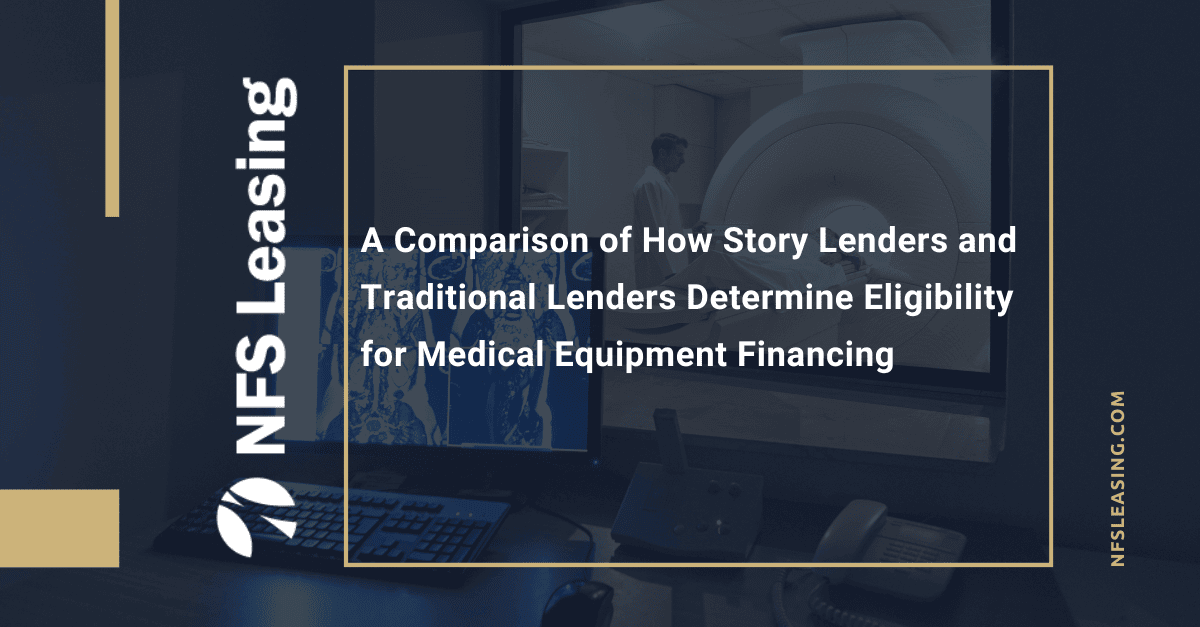
Medical equipment financing from a story lender can open doors for healthcare practices and facilities. With affordable leases and loans offered by lenders and equipment leasing companies, businesses can acquire updated medical equipment to improve profitability and patient care quality. For many, purchasing large, costly medical equipment outright is often impractical, making medical equipment financing a vital solution.
The Difference Between Medical Leases and Loans
Leasing medical equipment and taking out a loan are two distinct financial arrangements. Here’s a breakdown of the key differences between lease financing and a loan, particularly when it comes to acquiring medical equipment:
-
Lease Financing
Lease financing is a type of financing where a lender (lessor) provides equipment to a borrower (lessee) for a specified period of time in exchange for regular payments. At the end of the lease term, the lessee may have the option to purchase the equipment for a predetermined price. Leasing often provides flexibility in upgrading to newer medical equipment at the end of the lease term. It can benefit businesses that require the latest medical technology or want to avoid the risk of medical equipment obsolescence.
-
Loan Financing
Loan financing is when a lender provides funds to a borrower who uses the funds for a specific purpose, such as buying medical equipment. The borrower then repays the loan, plus interest, over a specified period. Ownership provides flexibility regarding customization, modifications, or selling the equipment at any time, and the borrower assumes the risk of equipment depreciation.
The choice between equipment lease financing and an equipment loan depends on the borrower’s financial goals, preferences, and needs.
Who Qualifies for Medical Equipment Financing?
Medical equipment financing eligibility varies among lenders, each employing distinct criteria. The profile of healthcare facilities seeking financing also varies.
-
Healthcare Facilities with Good Credit & Cash Flow Qualify
Traditional lenders, such as banks, often adhere to a more conservative approach when assessing leases and loans, including credit history, healthcare facility stability, cash flow, and profitability. These factors lead to a high approval rating for those with A and B credit ratings and steady, long-standing cash flow. However, it can pose a challenge for certain healthcare facilities seeking medical equipment financing, particularly those new, emerging, or undergoing restructuring.
-
Facilities with Less than Perfect Credit & Growth Opportunity Qualify
In contrast, “story lenders” base their decisions on a broader range of factors beyond the financials. They offer flexibility in the qualification process, irrespective of credit scores, by considering the potential opportunities. This presents a viable solution for healthcare facilities aiming to enhance operations, elevate patient care standards, or venture into new markets.
The diverse array of medical equipment lenders provides various solutions, enabling healthcare facilities to qualify for medical equipment financing regardless of their financial profile.
Story Lender Versus Traditional Lenders
When it comes time to explore medical equipment financing, it is good to understand the factors that influence eligibility by lenders. While most lenders evaluate factors like credit history, business health, stability, cash flow, and profitability, there are distinct differences by the type of lender.
Traditional Lenders: Traditional lenders like banks are subject to various laws and regulations enacted by the government.
- A bank’s decision criteria typically rely heavily on quantitative factors, such as good credit, time in business, and regular income, which equates to conservative lending practices and emphasizes a borrower’s creditworthiness and financial stability.
- Government authorities heavily regulate banks.
- Unfortunately, these rigid markers can limit early-growth healthcare facilities or those in a turnaround phase.
Story Lenders: A story lender is independent and not subject to the same laws and regulations.
- Story lenders make their own decisions and may use their own capital to finance their borrower’s equipment.
- They are more flexible and open-minded in their evaluation, looking beyond standard financial metrics to understand the borrower’s unique circumstances.
- They have a higher risk tolerance and are willing to work with healthcare facilities that may not meet the strict criteria set by traditional banks and provide solutions to support the opportunity.
- Their lending practices do not require specific factors on credit history, time in business, and cash flow.
- This provides an opportunity for many healthcare facilities that need medical equipment but were turned down by traditional lenders.
NFS Leasing is a Story Lender that Specializes in Medical Equipment Financing
NFS Leasing is an independent story lender specializing in medical equipment financing and leasing across the U.S. and Canada. By taking a more creative approach to growth and development than conventional financing sources, NFS Leasing empowers its customers to capitalize on market opportunities with access to flexible medical equipment financing solutions.
NFS Leasing understands that every client has a unique story and is ready to listen. Through collaborative discussions, we seek to understand each healthcare facility’s circumstances and provide equipment lease and loan options.
For more information about medical equipment financing and leasing, please contact us here today or call us at 866-970-4637.

